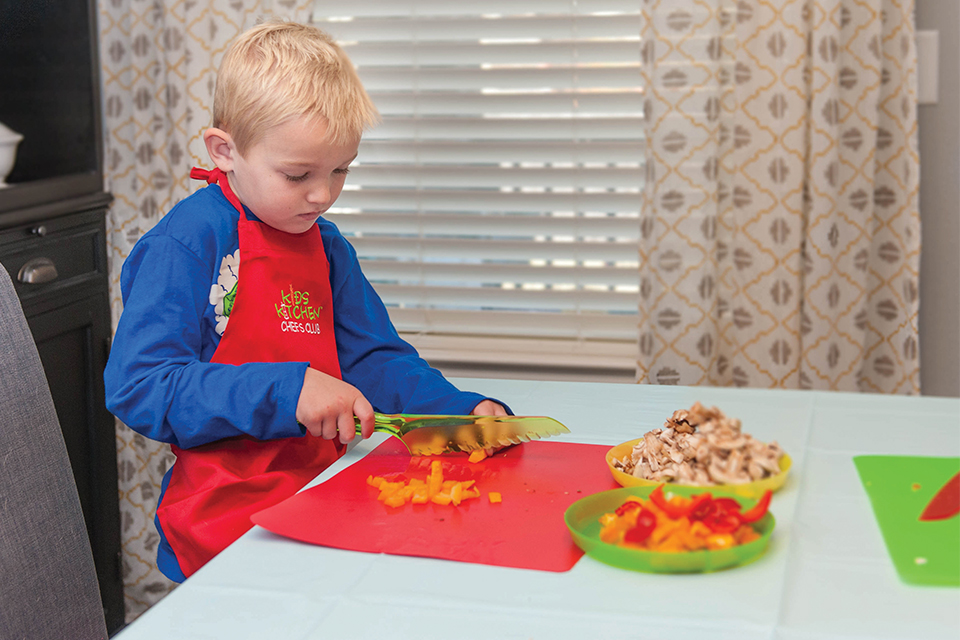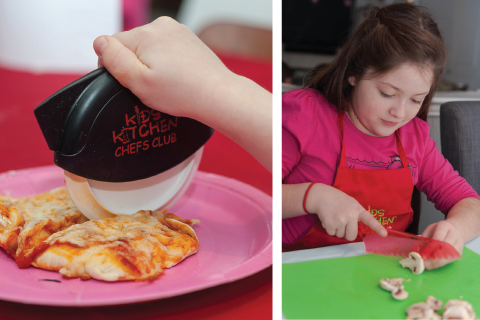Stepping Up to the Chopping Block

My 12-year-old son is watching over a pot of boiling spaghetti he’s been tasked with cooking for our Saturday night family dinner. “They taste pretty good, but I still don’t get why these brown noodles are better for me than the white kind,” he remarks. I remind him that whole grain pastas have much more fiber and nutrients in them than their enriched, white noodle counterparts.
“Just like bread, right?” he asks, making the connection. I can’t help but silently chuckle with parental satisfaction. Having him help out in the kitchen over the last few months was my sneaky tactic to curb his picky eating habits and teach him a thing or two about good nutrition in the process.
Cooking has always been “my thing” and—I’ll admit—I’m a bit of a control freak when it comes to people messing with my recipes or, worse yet, making messes in my kitchen. For these reasons, I had avoided passing the torch to my three sons. That was, until I learned about Kids Kitchen and Chefs Club, a traditional on-site cooking camp and at-home virtual cooking course, respectively, led by an Austinite, Leah Smith.
Smith is a native Texan, mom of two school-aged children, and a registered dietician and nutritionist. She helped me realize that while it’s far easier, faster, and less messy to take on all the household cooking responsibilities myself, the long-term benefits of teaching cooking skills to my kids—and making meals a family affair—far outweigh any of the plethora of dirty dishes.
From Fussy to Fearless
Engaging kids in the cooking process, from meal planning to preparation, encourages even the pickiest palate to try new healthy foods. After giving my three kids some basic nutritional advice and the thumbs-up to make dinner as they saw fit, I soon overheard them saying things like “this sauce needs more garlic” and “let’s stir in some edamame beans.” There was a mealtime miracle happening right in my own house!
Smith was pleased to learn of my kitchen observations and said she’s heard the same type of commentary come from youngsters in her cooking classes. Students invariably moan “ewww, gross” when a vegetable like roasted Brussels sprouts is on the menu. But, after donning their aprons and taking an active role in the cooking process, nearly all of her students are willing to sample the finished product and “probably 10 out of 12 students say they would eat it again,” Smith said.
Start Right, Stay Right
This hands-on exposure to new foods in the early years, coupled with the empowerment that comes from “making a meal yourself,” is key to raising children so they are more likely to make healthy food choices later in life. 
Although Kids Kitchen classes begin at age 5, Smith said that it’s never too early to start working with your kids in the kitchen. Every child, from preschool forward, has the capacity to learn something about cooking. Tiny hands can peel the husks off corn or knead dough. Early elementary-age kids can grate cheese, crack eggs, learn cooking measurements, and whip up simple recipes. Older children and teens with more kitchen experience will enjoy the challenge of tackling a new cooking technique (like grilling) or planning and executing a meal from start to finish.
“Teaching kids about what foods are good for them and why, having them practice cooking skills in a safe environment, and enabling them to create recipes on their own will have a positive impact on their life-long eating habits,” Smith said.
More Family Quality Time
In addition to the health benefits, an added bonus of teaching your child to cook is the extra quality time you get to spend together. Like many families, mine leads a hectic lifestyle. But, through the online video-based Chefs Club, I was able to teach my kids (at any time, place, and pace) how to cook.
For us, I found weekends offered the most convenient opportunities to knock out a few lessons, and I’m pretty sure my boys would agree that we made some good food and great memories together in the process.
On-site cooking lessons or camps taught by professionals (like those at Kids Kitchen), offer opportunities for family bonding. Sitting down and eating the kid-made meals together will help your kids’ self-confidence (as budding chefs will surely want to show off their newfound culinary skills at home). Study after study has linked reconnecting with your family over regular dinners to reduced rates of substance abuse, teen pregnancy, and depression, in addition to increased grade-point averages, self-esteem, and improved command of vocabulary.
So, what are you waiting for? Get in the kitchen and start cooking with your kids!
Visit TxKidsKitchen.com to find out more about cooking lessons and camps offered at Kids Kitchen. Spaces are still available for summer camps, and fall classes are currently enrolling in Austin, Round Rock, Lakeway, and Cedar Park.
Chefs Club, a monthly video-guided virtual program, makes a great alternative for the busy family and includes monthly boxes that are mailed to the child at home. Each shipment includes three activities (including how-to online videos), kitchen utensil(s) needed that month, newsletters, and prize drawing entries along with culinary and nutrition support from the Chefs Club Culinary Team.






